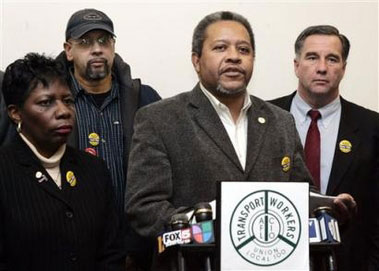|
New York city transit workers reject new contract
(AP)
Updated: 2006-01-21 15:34
New York City's 33,000 transit workers rejected a new contract by a mere
seven votes Friday, raising fears of another crippling strike like the one that
brought subways and buses to a standstill a month ago.

Transport Workers
Union President Roger Toussant, at podium, announces the results of a
contract ratification vote in New York, Friday Jan. 20, 2006.
[AP] |
The Transport Workers Union voted down the contract, despite the urging of
union President Roger Toussaint to ratify the agreement. He said the final tally
was 11,234 against and 11,227 in favor.
Mayor Michael Bloomberg, one of the harshest critics of the three-day walkout
in December, called the contract rejection "disappointing news to all New
Yorkers." He urged both sides to return to the negotiating table.
Toussaint did not address the possibility of another strike. But opponents of
the proposed three-year contract said they were hopeful a new deal could be
reached without another walkout.
"I would not advocate going back on strike," said union Vice President
Ainsley Stewart, who opposed the new contract. Stewart said opponents were most
upset by a provision that would have required workers for the first time to
contribute part of their salaries toward health care premiums.
Metropolitan Transportation Authority Chairman Peter S. Kalikow issued a
written statement expressing disappointment with the vote. The MTA, which
oversees the city's mass transit system, also informed the union it intends to
seek binding arbitration to resolve the dispute.
Toussaint blamed "downright lies" told by contract opponents for the
ratification failure but said the union's leadership was ready to "go back to
the drawing board" as soon as possible. He also said TWU members were worried by
Gov. George Pataki's threat to veto a key $110 million refund of pension plan
contributions.
The strike that started Dec. 20 shut down the nation's largest mass transit
system in the middle of the holiday shopping season. It was the first
system-wide strike since an 11-day walkout in 1980, and it left millions of New
Yorkers and tourists scrambling to find ways to get around the city.
It was also an illegal strike. State law forbids strikes by public employees,
and the walkout put the union and its members at financial risk.
The union was fined $3 million, and workers were docked two days' pay for
each day on strike, though a Brooklyn judge has yet to determine exactly how
much of those penalties the union and its employees will pay.
The rejected contract would have provided raises of 3 percent in the first
year, then 4 percent and 3.5 percent in the following two years. But it would
have required the workers for the first time to contribute 1.5 percent of their
salaries toward health care premiums.
The MTA agreed to drop a proposal that would have raised the retirement age
for new hires from 55 or required new employees to contribute more to their
pensions.
|